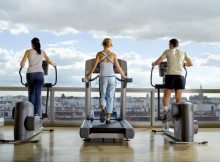The Dark Side of Fitness Trackers
Advertisements
Fitness trackers are big business. From simple pedometers to smart watches, from fitness wearable devices to mobile phone applications, juniper research's 2017 data shows that more than 75 million Americans will use fitness trackers by 2021.

Advertisements


 don't live or die because of your fitness tracker. [picture: emiliozv / iStock / gettyimages]
don't live or die because of your fitness tracker. [picture: emiliozv / iStock / gettyimages] 7. Katie ziskind, a licensed family and marriage therapist in Niantic, Conn., said that although the fitness tracker can be used safely by many people, people with mental health problems such as obsession, perfectionism and even eating disorders may overuse and abuse it. Obsessive compulsive disorder and eating disorders, such as anorexia, often outnumber their fitness tracker several times a day to count calories, check their heart rate, and use it to explain why it's created, "she said. How do you know that your tracking is a problem? Stefanie Juliano, a licensed clinical consultant in Rio de Janeiro, New Mexico, said he wanted to look for these warning signs:
UL>
Advertisements
; "if you find yourself doing this, it may be time for you to reexamine your relationship with the fitness tracker, or see a professional consultant," huliano said. If you use a fitness tracker to tell you that you have reached a certain mileage or a certain number of activity minutes, you may inadvertently let yourself back up.
& quot; if your training pace stays the same (same heart rate, pace, time, etc.), you may find that you are Marisa Michael, a certified personal trainer and registered dietician at real nutrition in Portland, Oregon, who says she artificially keeps herself at a comfortable fitness level. Why don't you often try to keep fit without a tracker? &What happens if you don't have a tracker? Michael says you may find yourself running faster or longer, or finding more fun in running. Paying too much attention to the data will reduce the individual's desire and ability to run more than one mile or a group of data.




